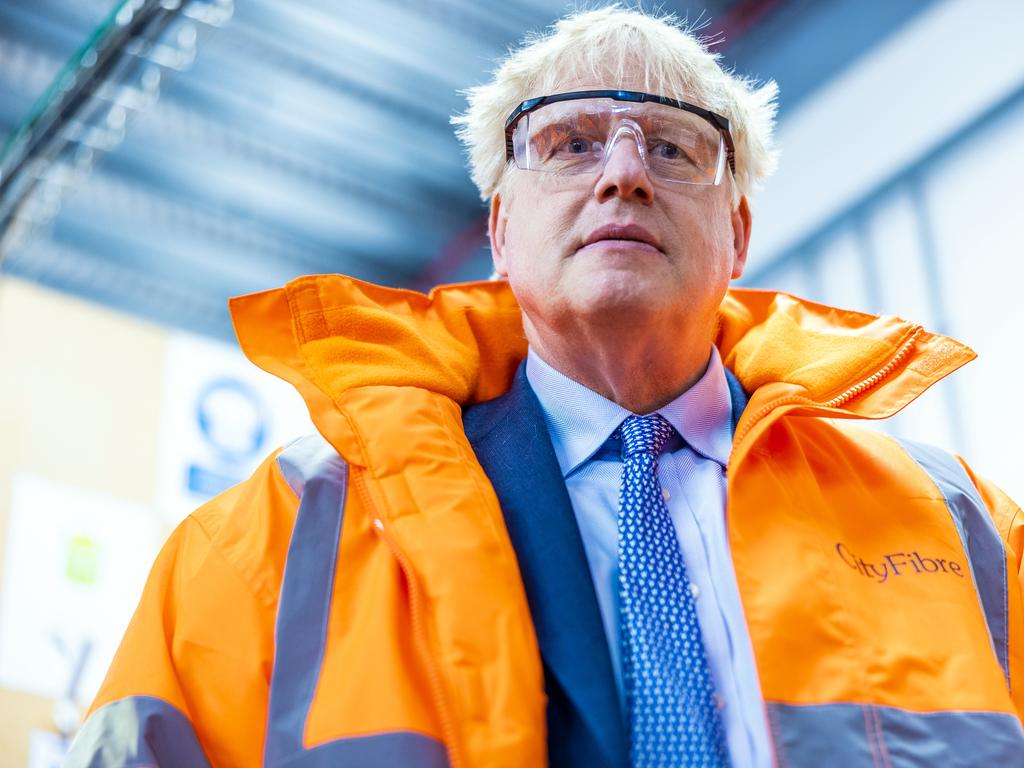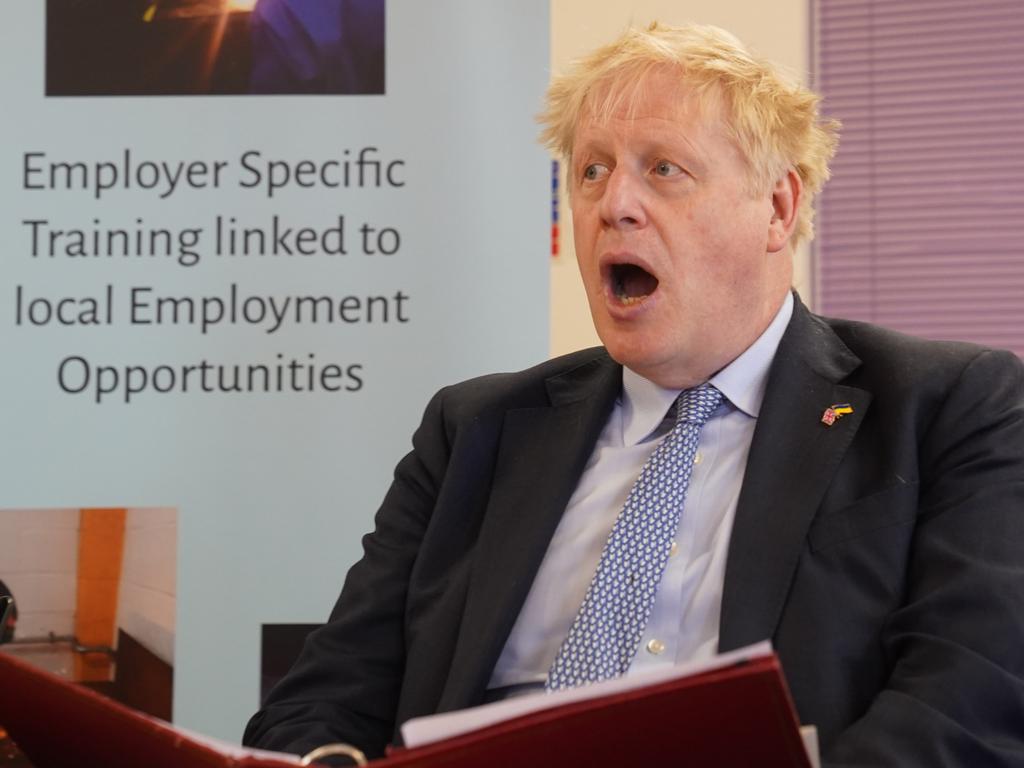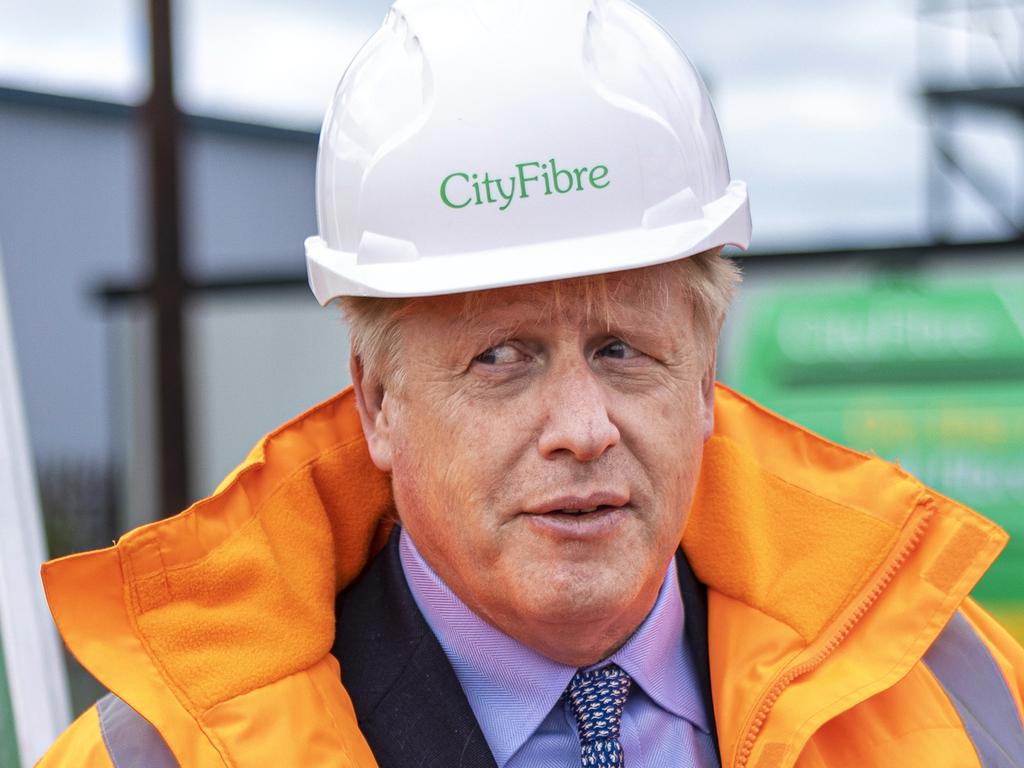British Prime Minister Boris Johnson wins no-confidence vote 211 to 148
Boris Johnson has welcomed his win in a confidence vote, but supporters fear he may have been mortally wounded.
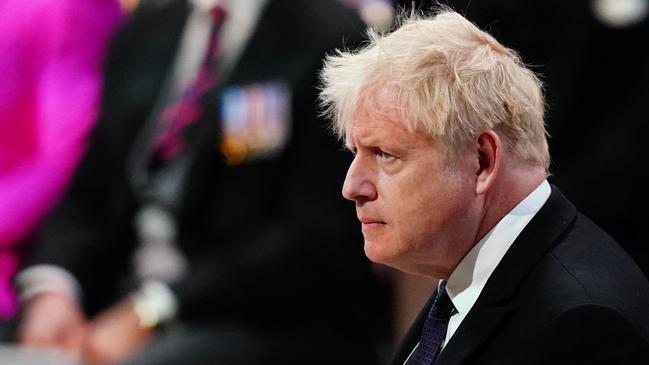
Boris Johnson has hailed his victory over Tory rebels in a no-confidence vote as a “good, convincing result,” despite the fact more than 100 backbenchers voted against him.
Mr Johnson survived an almighty political scare this morning, with 211 Conservative politicians voting for him to remain as British prime minister.
In a day of intense turmoil in Westminster Mr Johnson fended off 148 rebels, but the margin of victory indicates both the depth of distrust of him within the Tory party, and underscores an impression he may yet struggle to lead the party to the next general election in nearly three years time.
However Mr Johnson insisted the win was a “good result for politics and the country.”
“This was an extremely good positive conclusive decisive result to unite the party and focus on delivering our policies,” he said.
“We now need to come together as a government and as a party and what this gives us is an opportunity to do our job – focus on stuff that our public want us to do.”
He rejected claims that he had been wounded, pointing out that he had more support now than when he contested the Tory party leadership in 2019.
Mr Johnson had needed 180 votes – half of the 359 Tory MP’s – to stay in the job but getting just over 200 votes is a disappointing and uncomfortable result for him, with 40 per cent of his MPs voting against him.
This was a man who lead the Tories to a thumping 80 seat majority in late 2019, promising to get Brexit done and in a last minute plea to backbenchers on Monday, Mr Johnson reminded them of the divisions of that bitter battle, as well as his record producing an effective and efficient covid-19 vaccination program and his government’s strident military support to Ukraine.
Senior Tory MP Sir Charles Walker told Channel 4 News: “Does the parliamentary party say ‘right, OK, we’ve had the confidence vote, is it now time to move on, get behind the prime minister?’ Or will there be a temptation to have a rolling maul, a guerrilla war, for the next six, 12, 18, 24 months?”
Mr Johnson now has a short window of time to try and corral his own MPs behind his policies. The support given to him is, percentage wise, worse than the Margaret Thatcher’s battle against Michael Heseltine in 1990 which ended her political career.
🔸 Johnson leaving the Houses of Parliament after the vote pic.twitter.com/OVqdH7yP6l
— The Times (@thetimes) June 6, 2022
Before the vote Downing Street insiders were confident that those who had no confidence could be contained to double figures, yet the result was far more damaging.
Former Conservative cabinet minister David Gauke had told the BBC that it would be bad news for Mr Johnson if more than 100 MPs voted against him.
“I think it will be a little more than 100,” he said.
“If it gets to 133, comparing it with [former prime minister] Theresa May, then that’s a very uncomfortable result for him,” he added.
The electorate has been furious at the partygate scandal where 10 Downing Street staff conducted as many as a dozen parties and get-togethers, one of which was a BYO affair; another on the eve of Prince Philip’s funeral, while everyone else was suffering social deprivations under strict lockdown laws. There has been deep concern among some that Mr Johnson, who was given a small fine for attending a short birthday party, lied, or attempted to minimise the parties to parliament.
There was also disquiet among the backbenchers about Mr Johnson’s “Labour-lite” policies, including further handouts to help with the extraordinary cost of energy price rises and a recent rise in taxes through national insurance contributions to help pay for it. Many of the rebels are the arch Brexiteers who so strongly supported Mr Johnson during the election, such as former party whips Mark Harper and David Davis.
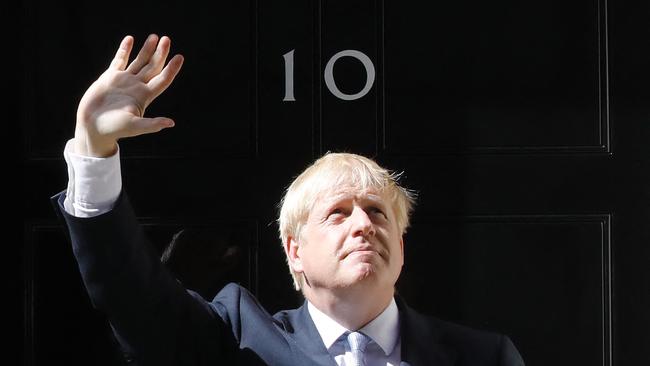
Mr Davis had told Mr Johnson back in January: “in the name of God, go”.
But Mr Johnson pleaded with the MP’s: “if you will give me your support tonight, we have the chance to stop talking about ourselves and start talking exclusively about what we are doing for the people of this country. And instead of getting into some hellish Groundhog Day debate about the merit of belonging to the (European Union) single market relitigating questions that we settled two-and-a-half years ago, we can get on, we can deliver, and we can unite.”
He said on the tax issue: “The way out now is to drive supply-side reform on Conservative principles and to cut taxes and to drive investment in the UK, taking advantage of Brexit freedoms”.
Mr Johnson was told of the confidence vote just before the final event of the Queen’s Platinum Jubilee, a pageant throughout London on Sunday afternoon, which was triggered by 15 per cent of the Tory MP’s submitting letters to the Conservative backbench organisation, the 1922 Committee.
The rebels had created a social media group and encouraged MPs to submit the letters to force the secret ballot about Mr Johnson’s leadership.
The rebel’s message had read in part: “The booing of Boris Johnson at the jubilee thanksgiving service tells us nothing that data does not. There is no social group that trusts him, with even 55 per cent of current Conservatives calling him untrustworthy against only 25 per cent saying he is trustworthy.” They added: “(the) entire purpose of the government now appears to be the sustenance of Boris Johnson as prime minister”.
Earlier on Monday before the result, the government’s anti-corruption tsar and Tory MP John Penrose resigned his post.
Vote triggered
Graham Brady, the chairman of the 1922 committee of Tory backbench MPs, said on Monday the threshold of 54 letters had been passed to trigger a vote of no-confidence in Mr Johnson.
“The threshold of 15 per cent of the parliamentary party seeking a vote of confidence in the leader of the Conservative Party has been exceeded,” Sir Graham said after counting the letters submitted over the weekend and informing the Prime Minister.
“In accordance with the rules, a ballot has been held this morning with the result expected at 9pm” (6am AEST).
At a meeting of the 1922 committee this afternoon ahead of the vote of no confidence, Mr Johnson appealed to MPs with promises of tax cuts and a major economic package next week. He warned MPs there was no one with an “alternative vision” after Jeremy Hunt, a potential leadership rival, said earlier in the day that he would vote to remove the prime minister.
He said the only way Labour would win the next election would be if the Conservative party was “so foolish as to descend into some pointless, fratricidal debate about the future of the party”.“Frankly there is no alternative vision that I’m hearing,” he said. “Let us refuse to dance to the tune of the media, let us refuse to gratify our opponents by turning in on ourselves.”
One of the most prominent MPs to admit they had voted against Mr Johnson was John Lamont, Parliamentary Private Secretary to Home Secretary Liz Truss.
“The events in Downing Street during the lockdown were unacceptable,” Mr Lamont wrote in a statement after voting. “People have been rightly deeply angered by what went on. “Whilst I recognise that changes have been made in Downing Street, the unfortunate reality is that the government has become overwhelmed by these events, to the detriment of my constituents and people across the United Kingdom.”
Tonight, I have voted against the Prime Minister in the Vote of Confidence.
— John Lamont MP 🇬🇧ðŸ´ó §ó ¢ó ³ó £ó ´ó ¿ (@John2Win) June 6, 2022
I have also resigned as PPS to Liz Truss at @FCDOGovUK.
My statement below 👇 pic.twitter.com/SGNFHsWwAr
A Downing Street spokesperson said the no-confidence vote was a chance “to draw a line and move on”. “The PM welcomes the opportunity to make his case to MPs and will remind them that when they’re united and focused on the issues that matter to voters there is no more formidable political force,” the spokesperson said after the vote was announced.
Devastating memo
The one-page memo circulated over the holiday weekend lists 13 reasons to drop Mr Johnson, concluding that the “only way to restore Conservative fortunes to a point where we can win the next general election, is to remove Boris Johnson as prime minister”.
A reason given for removing him is that he was booed outside the thanksgiving service for the Queen at St Paul’s Cathedral. The memo says this “tells us nothing that data does not”, citing polling that “no social group trusts him, with even 55 per cent of current Conservatives calling him untrustworthy”.
A Tory MP said: “A Conservative prime minister being booed by people who turned up to witness people arriving for a service in honour of the Queen is pretty dire. When you’ve lost the royalists, and a lot of them will be former service personnel, that’s our core vote.”
Mr Johnson was also booed while dining at Morito, a restaurant in east London where his son Theo worked. The Mail on Sunday said the Prime Minister responded with a “dismissive hand gesture and left”.
In an interview with Times Radio, Transport Secretary Grant Shapps pointed out that then Tory chancellor George Osborne was booed at the 2012 Olympics but the Conservatives won the next election.
Paymaster General Penny Mordaunt was on resignation watch amid speculation that she could walk out as early as Monday as part of an attempt to topple Mr Johnson and then stand herself.
The memo being circulated by the rebels said: “The damage done to trust in Boris Johnson is such that popular policies are falling flat with the public (e.g. cost of living measures). A pollster has dubbed him the ‘Conservative Corbyn’ because of this”.
One MP circulating the letter said: “Those who are still supporting Johnson are like Corbynites whose love of their leader kept them immune to any opinion outside their echo chambers.”
Mr Johnson was said to be in a “bullish mood” and confident of survival. Under party rules, the leader would be protected from another challenge for 12 months if he wins a vote. Some of the rebels wanted to wait until the two by-elections on June 23, which they believe will be lost, to give them the best possible chance.
As to who might succeed him, former health secretary Jeremy Hunt is at an all-time-high price of 15 per cent, Foreign Secretary Liz Truss is on 12 per cent and Commons foreign affairs committee chairman Tom Tugendhat is recording 11 per cent.
Mr Johnson was told soon after the conclusion of the four day partying honouring the Queen’s 70 years on the throne on Sunday night that sufficient numbers of sitting Tories had sent letters demanding a vote of no-confidence.
I have supported Boris Johnson for 15 years, for the London Mayoralty and for PM. Very sadly, I have written to him to say I can no longer do so, for the reasons set out below. pic.twitter.com/0Mjs4hjeSF
— Jesse Norman (@Jesse_Norman) June 6, 2022
Mr Johnson has been under sustained pressure following revelations that 10 Downing Street had held nearly a dozen parties and gatherings, including one which went until 4am on the eve of Prince Philip’s funeral in 2020 and last year.
This was at a time when the country was under severe lockdown measures during the covid-19 pandemic and critics claim Mr Johnson misled parliament when he said no rules had been broken.
Senior Tory politicians have begun a lightning offensive to keep Mr Johnson in the job, warning colleagues that any significant split in the party at a time of the Ukraine war, tensions with the European Union over the Northern Ireland protocol and a cost of living calamity could spark an early election.
With The Times, AFP


